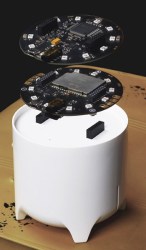Cruising through the children’s hands-on activity zone at Maker Faire Bay Area, we see kids building a cardboard enclosure for the Chatterbox smart speaker kit. It would be tempting to dismiss the little smiling box as “just for kids” but doing so would overlook something more interesting: an alternative to data-mining corporations who dominate the smart speaker market. People are rightly concerned about Amazon Echo and Google Home, always-listening devices for online retail sending data back to their corporate data centers. In order to be appropriate for children, Chatterbox is none of those things. It only listens when a button is pressed, and its online model is designed to support the mission of CCFC (Campaign for a Commercial-Free Childhood.)
Getting started with a Chatterbox is much like other products designed to encourage young makers. The hardware — Raspberry Pi, custom HAT, speaker and button inside a cardboard enclosure — is conceptually similar to a Google AIY Voice kit but paired with an entirely different software experience. Instead of signing in to a Google developer account, children create their own voice interaction behavior with a block-based programming environment resembling MIT Scratch. Moving online, Chatterbox interactions draw upon resources of similarly privacy-minded entities like DuckDuckGo web search. Voice interaction foundation is built upon a fork of Mycroft with changes focused on education and child-friendliness. If a Chatterbox is unsure whether a query was for “Moana” or “Marijuana”, it will decide in favor of the Disney movie.
 Many of these privacy-conscious pieces are open source or freely available, but Chatterbox pulls them all together into a single package that’s an appealing alternative to the big brand options. Based on conversations during Hackaday’s Maker Faire meetup, there’s a market beyond parents of young children. From technically aware adults who lack web API coding skills, to senior citizens unaware of dark corners of the web. Chatterbox Kickstarter campaign has a few more weeks to run but has already reached funding goals. We look forward to having a privacy-minded option in voice assistants.
Many of these privacy-conscious pieces are open source or freely available, but Chatterbox pulls them all together into a single package that’s an appealing alternative to the big brand options. Based on conversations during Hackaday’s Maker Faire meetup, there’s a market beyond parents of young children. From technically aware adults who lack web API coding skills, to senior citizens unaware of dark corners of the web. Chatterbox Kickstarter campaign has a few more weeks to run but has already reached funding goals. We look forward to having a privacy-minded option in voice assistants.















